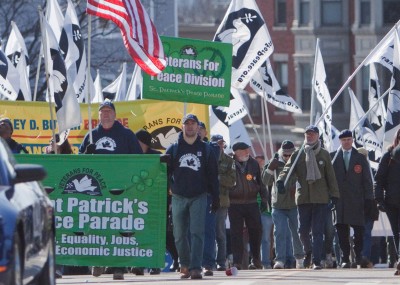Just over a month before the city’s annual St. Patrick’s Day celebrations, the local chapter of Veterans for Peace and the American Civil Liberties Union of Massachusetts filed a complaint on Feb. 12 against the City of Boston for allegedly not responding in a timely manner to the group’s application for an “inclusive, non-discriminatory” parade.

This year is the fifth year the Veterans for Peace Chapter 9, also known as the Smedley D. Butler Brigade in honor of the deceased U.S. Marine Corps major general, has held their parade. Each year, they have applied to march at noon, one hour after the St. Patrick’s Day Road Race and one hour prior to the South Boston Allied War Veterans Council parade. However, they have always been denied, instead told to march one mile behind the AWV parade.
For this year’s parade, scheduled for March 15, the VFP chapter applied for their noon parade permit in March 2014, and wrote in their application that they would not accept marching behind the AWV parade again, said Pat Scanlon, coordinator of Veterans for Peace Chapter 9.
“By doing that, it really disenfranchises us, marginalizes us,” he said. “This year, we have the real opportunity, the possibility, of being at 12 noon, and then all 700,000 people [at the parade] will be able to see our messages of peace and inclusion in our parade.”
Five years ago, the local VFP chapter applied to march in the AWV parade, but their application was denied because “they [AWV] did not want to have the word ‘peace’ associated with the word ‘veteran,’” Scanlon said. A 1995 U.S. Supreme Court decision made in Hurley v. Irish-Am. Gay, Lesbian & Bisexual Grp. of Boston, allowed the AWV to exclude any group promoting a different message than their own, the complaint stated.
VFP instead decided to create their own parade, “the only peace parade in the entire country,” Scanlon said, which has eight core issue areas. Their groups march to promote messages of peace and inclusion, he said.
“There’s room for everyone on the street, and what has happened in the past, because of us being marginalized and put in the back, [is] the city has literally been choosing one message over another,” he said. “They are supposed to be neutral in the permitting process for the groups that are on the street, but they’re clearly showing a preference for the other two things [the Road Race and AWV parade].”
Sarah Wunsch, deputy legal director of the ACLU of Massachusetts, said VFP has always applied nearly a year in advance for their St. Patrick’s Day parade permit, but the City of Boston has consistently not made their decision until the parade is approaching, at which point it gives the VFP chapter a permit for 4 p.m.
With this year’s application, the ACLU of Massachusetts, along with a law firm they are working with, followed up with the City several times to ask about the status of the application, Wunsch said, and got no response.
“This is wrong for the City of Boston to behave this way,” she said. “Parades are considered expressive, which get very important First Amendment protection.”
VFP is asking the court to issue a preliminary injunction, Wunsch said, which would grant the noon permit for VFP and not interfere with the AWV parade. A scheduling hearing is planned for Thursday.
“The city should, in the future, act promptly on parade permit applications, not just for Veterans for Peace but for any groups that apply,” she said. “Often, this is time-sensitive. There’s some specific reason to have a parade at a certain time, and the city shouldn’t delay. So this could affect and benefit more people.”
A representative from Boston Mayor Martin Walsh’s office did not respond to a request for comment.
Several residents said the VFP local chapter should be allowed to hold their own parade, and the City of Boston should be responding to applications in a more timely fashion.
Francisco Alejandro, 17, of Brighton, said the City should not be denying the VFP chapter from holding their parade at the time they requested, and a decision needs to be made sooner than it has been in the past.
“It’s veterans. They fight for our country, so if they’re asking for one simple thing, just give it to them,” he said. “They don’t ask for much. They just ask for one simple parade. That’s it.”
Matthew Culp, 26, a student in Boston University’s Metropolitan College, said he’s aware there’s been a controversy about which groups can and cannot participate in the parade in the past, but the City should be working to level the playing field.
“There should be room to let people do what they want, even if it’s not well-liked or if there’s controversy around it because if there is controversy, people have the freedom to say what they want about it,” he said.
Wendy Webber, 45, of Fenway, said the City should be required to respond to applicants within 30 days of the application being received.
“They [the city] should have a timeframe of how long they take to respond,” she said. “They [VFP] have been having it [the parade] in the past, and they’re representing a particular group. If they have enough people in it that are willing to participate, why not?”






















































































































